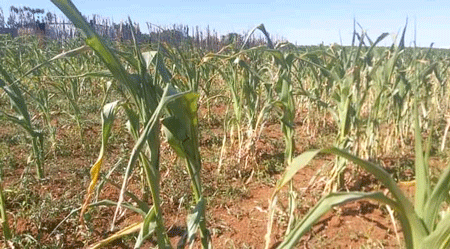
Embracing Insurance to secure Farm Produce
BY JOHN NDIRANGU
At Kindawa Village, Ol Kalou Constituency in Nyandarua, the thirty-acre flourishing farm is surrounded b weedy farms from one side, emaciated potato and maize crops in other farms.
But Mr David Njuguna’s farm is weeds-free with a minimum of two maize cobs per plant.
While other farmers do farming as a tradition in a county where potato is the main cash crop, Mr Njuguna must heavily invest and follow all agronomist advice and on time, reason been he has insured his crop.
“I have been in farming for more than ten years and experience has taught me the hard way. That is why I insure my crop because am guaranteed returns whether there is a crop failure due to climate factors or other disasters. I don’t want to gamble with my money investing in farming activities that come with a lot of unpredictable challenges,” says the farmer.
Mr Njuguna is a cereals broker for over twenty years and has traversed Tanzania and Uganda to buy the maize, but opted for farming after years of experience in the trade.
“Kenyan millers prefer Kenyan grown maize which has less aflatoxin compared to that imported from neighboring countries that sell maize at lower prices due to low production costs compared to Kenya. But any miller easily goes for Kenyan maize whose quality and levels of aflatoxin are far much lower,” said the farmer.
He also says that he earns better returns growing his own maize than buying from farmers or from brokers.
At peak season in most parts of the country, the brokers offer between Sh2, 000 and Sh2, 400 per 90-kilo bag of maize.
With proper agronomy practices, Mr Njuguna invests Sh35,000 per acre planted with maize, which is an increase from between Sh25, 000 and Sh30, 000 last year attributed to increased prices of farm inputs.
From one acre, the farmer will harvest an average of 40 bags to sell at a fixed price o Sh3, 000 per bag to the millers.
From the 30 acres, the farmer earns Sh3.6 million, compared to the production cost of Sh1, 050, 000 but the production cost is not inclusive of the insurance cover.
“Most farmers do not plant maize in Nyandarua due to prolonged maturity to harvest due to cold weathers in the region, they opt foe Irish potato which fetches poor prices due to glut. I planted my maize in April to harvest in January, the potato growers will have gone two seasons before I harvest but none of them will earn better returns than what I earn from maize,” said the farmer.
According to the insurance documents, Mr Njuguna has insured the 30-acre farm with a total sum of Sh1 million which covers the production cost, but to insure the amount he only needs to pay the insurance company a total sum of Sh105,377.50 at a rate of 7.5 making a total of Sh75, 000 Sh30, 000 farm inspection fee by the Insurance company agronomists while the balance is meant for normal government taxation
Perils insured include drought on rainfed farming uncontrollable pests and diseases, hailstones, frost, flooding of the crop field, excessive rainfall, fire, and windstorm and the basis of the insurance cover is the cost of production.
Apart from planting manually, all the land preparation is through mechanized agriculture, and one acre is planted by eight people in a day.
He uses fertliser at planting, followed by spraying against the weeks two weeks after germination when the first top dressing is done.
At his farm, the second weed control through spraying is done about two months later followed by a second top dressing when the plants are 4 months old.
At planting, his spacing is 2.5 feet between rows and seven inches between plants, planting a single seed per hole.
“The next important stage is at harvesting, one must be there to supervise, we do it manually since the harvesting machines crush most of the maize at the farm. We then dry to meet the required moisture content, we have a moisture testing machine,” said the farmer.
With experience, he says many millers like Nyandarua grown maize as the slow growth rate gives it unique quality and taste.
Agricultural officer Geoffrey Ndirangu admits that few farmers insure their crops simply because they do not want to adhere to agronomist advice and crop growing calendar.
“We advise farmers to insure their crops, it’s very important to incase of a natural disaster. But only a few farmers in agribusiness insure their crops. The most critical thing to enquire from the insurance company is the duration of payment in case of crop failure. One can also insure livestock in case of drought or disease outbreak or any other disasters,” says Mr Ndirangu.
He says more serious farmers insure their crops against projected harvest, but it also requires more funds, just in case the farmer fails to harvest the targeted amount and had adhered to all agronomist advice and crop calendar.

